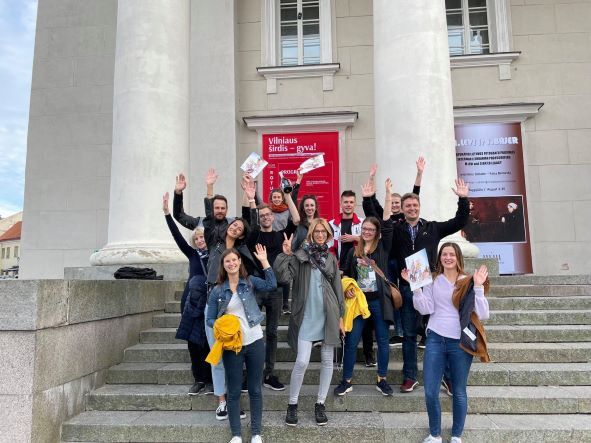Egle Beigaite is a 4th year PhD student at the University of York who completed her PIPS placement at CasZyme, a biotech company based in Vilnius, Lithuania. CasZyme are an organisation whose research focuses on revolutionising the field of CRISPR-based Molecular Tools.
The featured image is of Egle with her PIPS colleagues.
What did you do?
My project focused on the characterisation of Cas proteins which could be used in genome editing. The techniques that I was exposed to included: colony PCR, protein purification using AKTA system (Ni and Heparin columns for affinity purification), bacterial cell transformation, cloning, RNA, DNA and plasmid purification using minipreps and midi preps. One of the main aims of my project was to determine the optimal growth and expression conditions for bacterial cells, which were then used to purify Cas proteins. I was also introduced to RNA synthesis (in vitro transcription), Cas protein and gRNA complex assembly as well as Cas activity assays.
What made you want to do that particular placement?
While relatively recent, CRISPR genome editing technology is becoming the main workhorse for genome editing in both academia and industry. Dr Gasiunas, who established the company, has previously worked in Prof. Siksnys’s lab and published several key papers in CRISPR research (Gasiunas et al 2012; Karvelis et al 2015; Gasiunas et al 2020). Prof. Siksnys, together with Prof Charpentier and Prof Doudna have received a prestigious Kavli prize for his independent development of CRISPR. I believed that it was the best accessible location for me to deepen my understanding in CRISPR technology and learn new protein characterisation techniques. In addition, this is a start-up company with only 10 employees. I thought that, by starting in such a small company, it would be easier for me to adapt and would also allow me to learn more things.
How did you go about finding and planning your PIPS?
Initially, I picked two countries I believed I could easily find an internship: the Netherlands and Lithuania (I am originally Lithuanian and started search way before COVID began), and researched biotech companies in both countries. After the interviews, I received two offers from Centre for Human Drug Research (CHDR, Netherlands) and CasZyme (Lithuania). Eventually, I chose to go to work for CasZyme as I really wanted to broaden my understanding of CRISPR technology.
Regarding CHDR, my project there would have focused on neurological conditions, which is what my PhD project is about, so I found it less interesting (although it seemed like an amazing place to learn new things).
What have you gained from doing your PIPS?
I have become more confident with working with large number of samples and have also learnt how to prioritise the experiments and to perform them as efficiently as possible. In addition, I have learnt how to use AKTA protein purification system and performing CRISPR complex assembly and Cas protein activity assays (which are performed in RNAase-free box).
I also gained invaluable experience in working as part of a small biotech company and learnt first-hand the importance of collaboration and teamwork. To ensure that projects were finished according to the deadlines, experiments were efficiently redesigned and redistributed to several staff members. I learned that great communication and flexibility with your team members is extremely important, as these people also teach you new techniques and can also help you to troubleshoot.
How would you sum up your PIPS experience?
Of course, pandemic has made it a bit more difficult to travel, but I am glad I did my PIPS in CasZyme as it was great experience. I have learnt a lot of new techniques and developed friendly relationship with my colleagues. My primary laboratory manager planned the project in such a way that allowed me to learn as much as possible during my placement and made the internship comfortable during these difficult post-pandemic times. I really enjoyed being part of research team and part of CasZyme community. Most of the staff were of my age, some also doing industrial PhDs. It was great to share the experience and support each other.
What advice would you give to other PGRs about PIPS?
Don’t be afraid to explore options outside your project (and comfort zone)! PIPS are aimed to help you learn new things, and add extra skills on your CV. I would personally recommend testing yourself in industry to see if you could work in a team with other people. The experience is also beneficial to see how industrial projects are managed and how things are generally organised (it might be quite different from your lab). I would recommend starting in a relatively small industrial company, as usually these biotechs are highly collaborative with academia and thus the working environment is slightly closer to the PhD in academia. Also, it means that you will be able to meet most of the staff during the placement and learn from them as much as possible.


